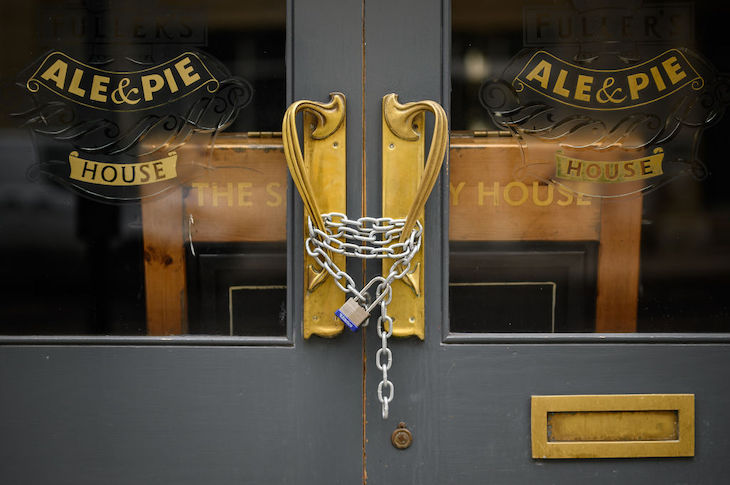Takings were falling. Regulars were drifting away. Our pub was in a bad way. It was clear that things needed to change. But, paralysed by fear of an employment tribunal in a legal system tilted against employers, we felt trapped. If we sacked the managers and replaced them, we could find ourselves embroiled in a messy legal case that could cost us everything. So, drowning in paperwork, warnings, hearings, improvement plans, and risk assessments, we endured. Running a pub felt less like hospitality than surviving a siege of bureaucracy.
That was when I saw it. This wasn’t just one bad incident. Our beloved pub was being strangled in red tape. We’re not alone. It’s as if publicans can’t be trusted to behave like adults. No wonder so many pubs are closing.
Pubs are Britain’s weathervane: where they go, the country follows
This year, I’ve conducted three exit interviews for staff who hadn’t committed egregious sins, merely chafed at being managed. One barmaid, asked to wash her hands after smoking, kicked up a fuss; I was advised to draft a ‘performance improvement plan’. Another left after ‘verbal feedback’ was deemed too direct. Each departure is logged in the compliance file, alongside training records, grievance forms, and recorded conversations. A new administrative layer now defines pub life.
Ask any landlord, and the tale repeats: it’s not just beer prices or energy bills killing us. It’s the culture of fear, the sense that you cannot act, speak plainly, or decide without consulting a policy. We’ve traded instinct for instruction manuals, losing not just time but trust. You cannot run a pub on risk assessments and passive-aggressive emails. Human resources should be human and a resource, not a weapon used against us.
In the 1990s, pubs ran on common sense. Don’t steal, don’t drink on shift, don’t brawl – beyond that, a landlord’s authority stemmed from trust, not certificates. A quiet word or a firm bollocking sufficed. Now, compliance officers, employment lawyers, and laminated forms have invaded. Verbal warnings, written statements, monitored targets – all administered via HR templates. No one meets your eye; they just send an email. Last month, a regular, a retired headmaster, watched me complete a staff training log and sighed, ‘You’re a landlord, not a clerk.’ He’s right. But clerks we’ve become.
The statistics bear this out: the number of employment tribunals rose by 30 per cent between 2023 and 2024; bureaucratic roles, including HR, have jumped dramatically in recent years. The cost of all this is paralysis – protection traded for ritual. Every decision is second-guessed, every interaction documented. A mate who runs a garage spends more time on compliance than fixing cars; a teacher friend dreads giving feedback, fearing a grievance. Britain is now a nation of box-tickers.
Pubs are Britain’s living rooms. Turn them into policed zones, and you strip their soul. Even in my village – Lib Dem, politically correct yet fatigued – locals feel it.
‘It’s the lawyers now,’ a carpenter grumbles over his pint, echoing a culture of complaint. Last week, a customer slipped on a wet floor. No harm done, but I spent an hour filing an incident report, just in case.
Worse looms. Labour’s proposed employment law reforms, which could mandate landlords to police ‘third-party harassment’ – a customer’s off-colour joke, a bit of banter – threaten to turn pubs into surveillance hubs. The Equality and Human Rights Commission has warned such rules could chill free speech – and they’re right. Imagine me, pint in hand, eavesdropping on tables to ensure no staff member takes offence at a bad gag. The paperwork would multiply: incident logs, witness statements, sensitivity training. The pub, a place of laughter and release, would become a courtroom.
Let me be clear, employment laws have done some good. The Employment Rights Act 1996 protected workers from rogue bosses, unfair dismissals, unsafe conditions and exploitation. But the pendulum has swung too far. What began as a shield for the vulnerable is now a cudgel for the oversensitive, weaponising grievances to paralyse management. Good staff suffer, ‘walking on eggshells’ around shirkers who are quick to complain at the slightest critique and know all their rights but little of their responsibilities.
The current government, led by men and women with almost no business experience, seems ill-equipped to navigate this. Their instinctive ‘nanny knows best’ approach – evident in everything from proposing garden smoking bans to net-zero edicts – bodes ill for complex legislation. Lacking a grounding in either business or human nature, they risk crafting laws that smother free speech and bury small businesses in yet more forms. The potential damage is terrifying: not just to pubs, but to the national spirit. Pubs are Britain’s weathervane: where they go, the country follows. If we lose their warmth, their freedom, we lose something deeper.
This isn’t just my pub. Publicans nationwide are managers in name only, shadowed by faceless advisors – HR reps, compliance officers, legal helplines – making real decisions. Local judgment has vanished, replaced by remote procedure. We’re losing management by character, the instinct that built pubs. Character should matter; steadiness should matter. We trust a man for his judgment, not his policy manual.
Post-war Britain was rebuilt with grit, not flowcharts. Yet today, we’re governed by caution, not courage. So, what’s the fix? Reform employment law to prioritise common sense over litigation – streamline tribunals, cap payouts for frivolous claims. Empower landlords to manage with authority, not fear. Training should teach human judgment, not just compliance. And let’s rebuild trust, where staff and owners share mutual respect, not suspicion. The government could cut red tape for small businesses, as promised in last year’s budget. But such promises never seem to be delivered.
On a quiet Wednesday, after submitting another form, the lunch crowd trickled in. A new lad needs showing how to pour a Guinness. I’ll risk it, without a flowchart. For now.







Comments